Rosamund Pike is
one actress who defies categorization. The London-born beauty has
spent over a decade on screen and stage. The one constant in her
career is that you never know quite what she will do
next.
She is probably
best known for her work on art house films. She played Keira Knightley’s
sister in Pride and Prejudice, and also co-starred as Carey
Mulligan’s best friend in An Education and in The
Libertine with Johnny Depp.
However if you
write her off as an arty actress you are missing so much of her
career. She’s also done her share of big-budget features. She was
a Bond girl in Die Another Day. She has also done action
films like Surrogates with Bruce Willis and Doom with
Dwayne (The Rock) Johnson.
Currently Pike
has released two of her most interesting films. In recent months she has
been getting acclaim and award nominations for her role in the
British import Made in Dagenham, a historical drama about
plucky women at a Ford factory who
protested to be able to get women equal
pay.
She also is
playing Miriam in the film version of Mordecai Richler’s final novel
Barney’s Version. Her character is the
third wife and true love in the
life of a cynical Canadian television exec (played by Paul Giamatti).
The film takes place over a period of decades and Pike’s character
ages about 30 years on screen.
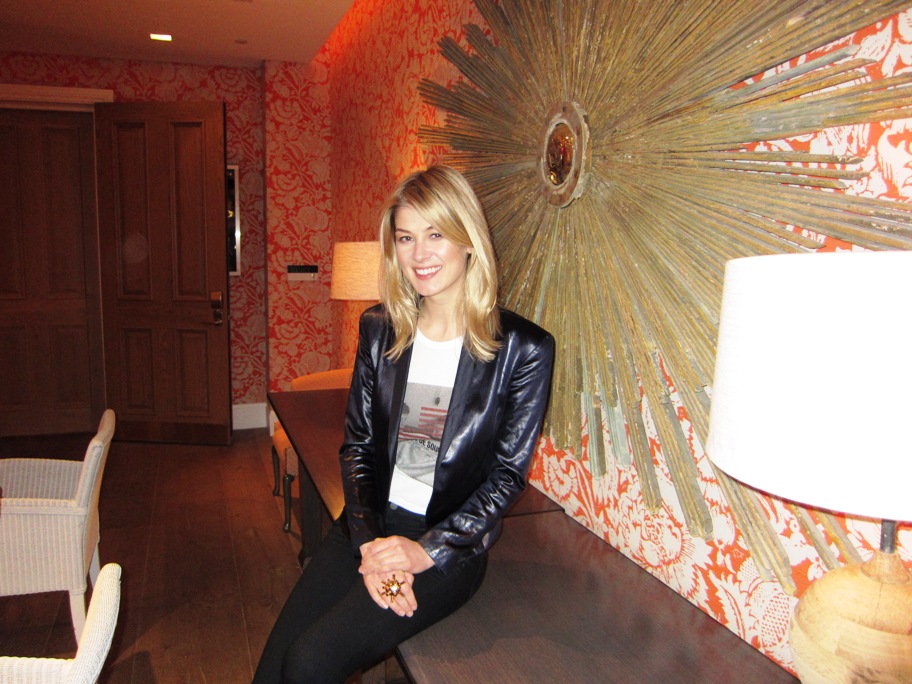 Pike was nice
enough to sit down with me for this exclusive interview at the
Crosby Street Hotel in New York just a few days before the Barney’s
Version premiere.
Pike was nice
enough to sit down with me for this exclusive interview at the
Crosby Street Hotel in New York just a few days before the Barney’s
Version premiere.
As
a British actress you had to completely change your accent.
How hard was that?
It was
interesting, because I went to Italy with my dialect coach, because
we’re both such Italian… what’s the word, like Anglophile. Italiophile? So we just traveled around in Tuscany and spoke
American that the whole time. It was very interesting to be treated
like an American. She’d correct me on little things, but to the
Italians ostensibly we were both American. It was palpably
different. It was like, I don’t know if they expected us to be more
difficult in restaurants because they knew we were American.
Something, there was some difference….
I sort of
missed being English, in a funny way. I missed how waiters treated
me. It was quite eye-opening. But it certainly worked, because in
this movie, I felt totally free in the American accent, which was
good. It felt like my voice, just with an American accent.
[Director] Richard [J.
Lewis] and
[Producer] Robert [Lanto]
were saying when they brought you in, they were originally
thinking of having you play the first wife.
Yeah.
When did you
sense the shift that they started thinking of you for Miriam?
Well, I never…
obviously Miriam is the plum role and a wonderful character that is
really inspiring, but Flora is a very good role. Sadly, she has
been cut a lot in the film, just to do with the time. She’s a far
more complex creature than unfortunately ended up on screen. But
Richard actually came to see a play I was doing with Judi Dench in
London, called Madame de Sade. Just by chance, that spans
over a decade. Even though we don’t really change
makeup or do prosthetics, there is this sense of aging. I think
after seeing that he thought,
“You know, I think this girl could be
Miriam.” I certainly had a spiritual connection with Miriam. It
was strange. I sort of felt an affinity with her – even in the
older age. I didn’t find that such a hard leap, in a funny way. I
don’t know why.
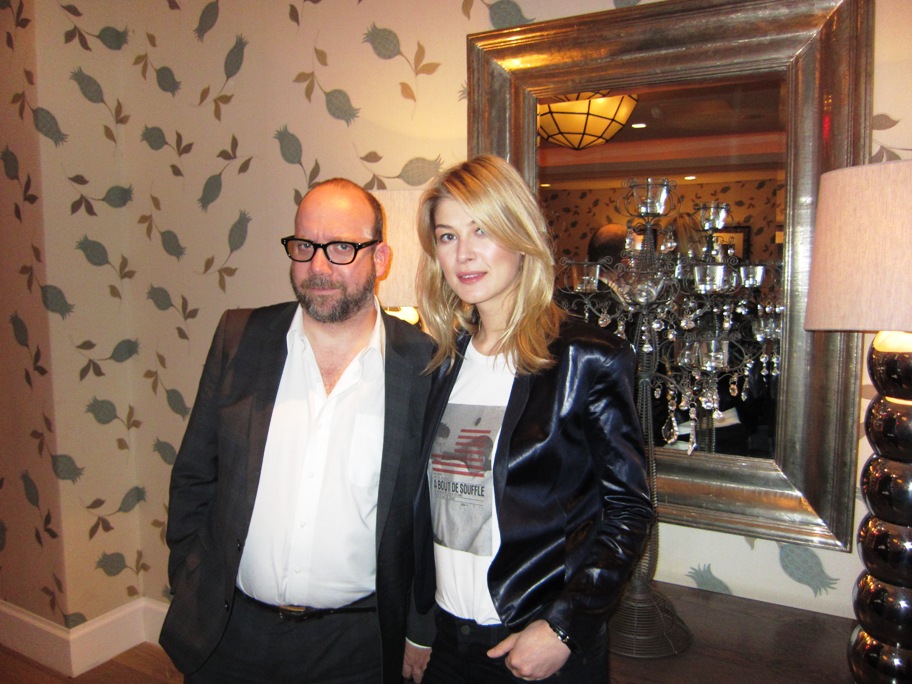 You were saying
in the other room that you had actually read the book before
getting involved in the project –
Richard had given it to you.
You were saying
in the other room that you had actually read the book before
getting involved in the project –
Richard had given it to you.
Yes.
Did
you picture yourself at all as the character when you were
originally reading it?
As Miriam? No, I
read it purely as a novel. I suppose I was intrigued by Flora,
actually, originally. I thought Miriam was this character, but I
never even dreamt that I could play her. The script showed her as
this dark-haired beauty with piercing blue eyes. I don’t know, if
you read that and you just think: no, no, that’s not really me.
Then of course, through the wonders and magic of movie making, there
you are, age 60, with dark hair. (laughs)
How strange is it
seeing yourself made up as you might look in your sixties?
Disconcerting.
Fairly reassuring, on some levels. It made me think differently
about men. I became rather invisible to men as the older Miriam.
Then it would ignite their interest again when I was playing the
30-year-old Miriam again. It’s very interesting, you know. The
Miriam when she had all her lovely, long hair suddenly became more
attractive to people.
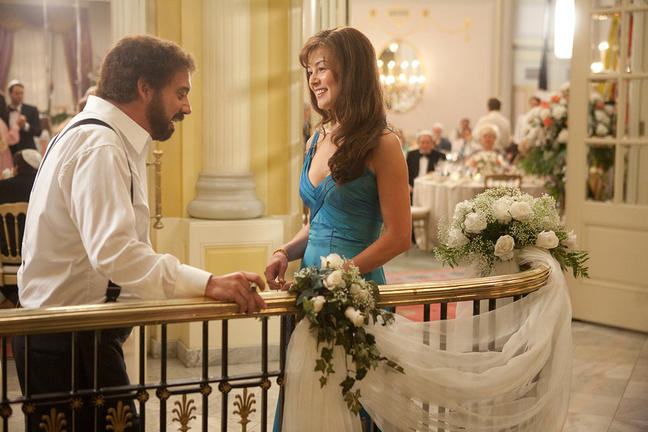 And was the
makeup hard to do?
And was the
makeup hard to do?
It was a far
different process, because you actually feel it on your face. You
feel the pull of gravity by the addition of weight on your face.
Physically, you’ve got layers on. So, the upward motion is sort of
pulled down. You feel your face is pulled down. It helps you feel
just that – you know, your shift of weight. I talked to a dancer
about it, about what growing old feels like. I said it really is a
sort of downward shift in weight. When you get up you just feel
different. As opposed to I’d get up like that. (stands up
quickly, then says to the recorder) I just demonstrated it. It
was fascinating process and I’m amazed we actually pulled it off,
because it was one of these jobs I definitely wanted, then when you
get in, you think, my God, how am I going to pull this off?
One
of the obviously interesting things about the movie is that Barney
basically starts hitting on Miriam at his own wedding…
I know! I know
and some people have said they found that creepy. I think what
happens is that these two people found they have a profound and
unusual connection. I don’t necessarily believe in love at first
sight, but I do believe in a sort of infatuation within the first
conversation (snaps fingers) because that’s when you really
spark. There’s sort of an undeniable connection between these two.
Not a sort of casual flirtation. They connect over books and cigars
and humor and just a recognition of... there was a sort of ironic
quality to their first conversation. I think it was a meeting of
minds.
It’s weird,
because Miriam never seemed to want to further the
relationship with
Barney while he was still married, and yet she didn’t exactly stop him either. Do you feel
that in some strange way Miriam had it in the back of her mind, too?
Yeah, but I think
she’s totally respectful. She also sees that he’s drunk.
She sees that Barney drinks too much right from the beginning. He’s
drunk when he comes onto the train. I think she is almost quite
charmed in spite of herself. Her better judgment is to get
this man out of this place as fast as possible and send him back to
his wife. Because I think also she would hate to be involved and
suddenly implicated as the other woman in a situation that’s not of
her making.
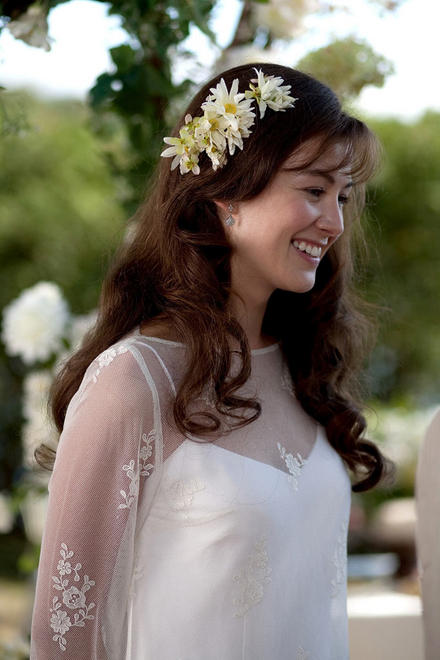 In honor of that,
what was the oddest or most inappropriate circumstance in which
someone tried to pick you up or that you have heard of someone
doing?
In honor of that,
what was the oddest or most inappropriate circumstance in which
someone tried to pick you up or that you have heard of someone
doing?
Oh, my gosh. I
don’t know, I always think that the swimming pool is a really dodgy
place to be hit on. I mean, I have been approached before and it’s
like:
“Really? Are you going to be that obvious? You wait until
I’m in a bathing suit and then you’re going to hit on me?” I think
that’s probably the least appealing. Uhh… yeah, I can’t think of
any other particularly odd ones.
What
was Paul Giamatti like to work with?
A dream. I adore
Paul. Couldn’t you tell when you were in there? I really just
believed in him as Barney. He made me laugh. I find him
intellectually inspiring. I feel we have similar kinds of appetites
for life and literature and curiosities and art and that kind of
stuff. Then, you know, there was no bullshit with him. There’s no
tricks. There’s no trying to save his performance until it’s on his
side – until he’s on camera – and all these kind of stupid things
that some arrogant actors do. He’s got no ego. I just love it.
Also, I don’t
remember you doing much with Dustin Hoffman…
No, I only have
tiny, brief fleeting moments.
But what was he
like to be around?
He just rated
Paul and I on our kiss at the wedding and said whether it was good
enough or whether it might give Paul a hard on or not. He says these things and you can’t believe that they’re
coming out of Dustin Hoffman’s mouth. Then you think, maybe if it
was anyone else you’d just tell them to back off. But because it’s
Dustin, you kind of accept it. You think I can’t believe he’s
talking about erections and all these sort of things while we’re
trying to pretend we’re having the happiest day of our life. He’s
like a dirty father-in-law, you know?
I’ve noticed that
you have gone back and forth in your career between artier films
like
Pride & Prejudice and An Education and more mainstream
roles like Die Another Day and Surrogates. Obviously
you can’t choose what is offered to you, but does the variety appeal
to you?
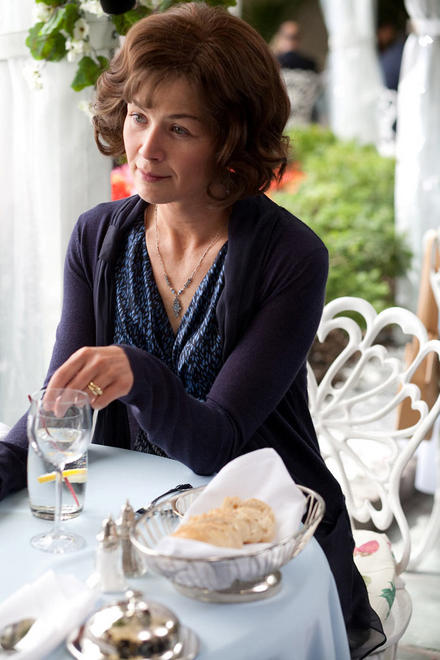 Well, you do
choose to a certain extent. You can always not go up for something
or you can always just say no. Emma Thompson once told me that it’s
as important not to work as to work. What you say no to
is as
important. But, you know, sometimes it just fires your
imagination. You think, I can do this small budget movie. Or,
yeah, go and do a big movie about human beings living a surrogate
life as robots. That sounds pretty neat. It’s great. It’s lucky
to be able to do either way.
Well, you do
choose to a certain extent. You can always not go up for something
or you can always just say no. Emma Thompson once told me that it’s
as important not to work as to work. What you say no to
is as
important. But, you know, sometimes it just fires your
imagination. You think, I can do this small budget movie. Or,
yeah, go and do a big movie about human beings living a surrogate
life as robots. That sounds pretty neat. It’s great. It’s lucky
to be able to do either way.
The
first time I remember seeing you, and probably most people do, was
when you joined the long history of The Bond women. What was it
like to be part of such a legendary franchise?
It still is
amazing. It’s not even what it was like, but it still does feel
like you’re a part of that. It’s phenomenal. Recently, I just
recorded one of the Bond novels on an audiobook, because they are
releasing the whole 20 original Ian Fleming novels next year. This
one of them, The Spy Who Loved Me, was narrated by a woman.
It’s a great read. They are great stories, even though it’s not
that similar to The Spy Who Loved Me the movie. But you’re
always a part of that, too. And you’re always called up to bat when
there are things like that to be done. I love it. I love it.
You also have
just done
Made in Dagenham. I haven’t seen it yet, but have heard good
things. It hasn’t really taken off here in
the States yet. What would you like
to tell people to get the word out?
Made in Dagenham
is an extraordinary story. It’s a political struggle movie, but
with tremendous humor, as only the Brits know how. They can do a
movie about a serious subject, but do it with such an irrepressible
sense of humor. It’s very funny. It’s kind of – you know, girls
going about getting what they want in a very unexpected way. For
women, I think it’s sort of a must-see film, because it’s the
beginning of what we are still fighting for today, which is equal
pay. England is lucky enough to have equal pay with their male
counterparts and they have these girls to thank – the girls from the
Ford car factory in Made in Dagenham. I love the film. I
really love it.
CLICK HERE TO SEE WHAT ROSAMUND PIKE HAD TO SAY TO US IN 2017!
CLICK
HERE TO SEE WHAT CO-STAR PAUL GIAMATTI HAD TO SAY TO US ABOUT
BARNEY'S VERSION!